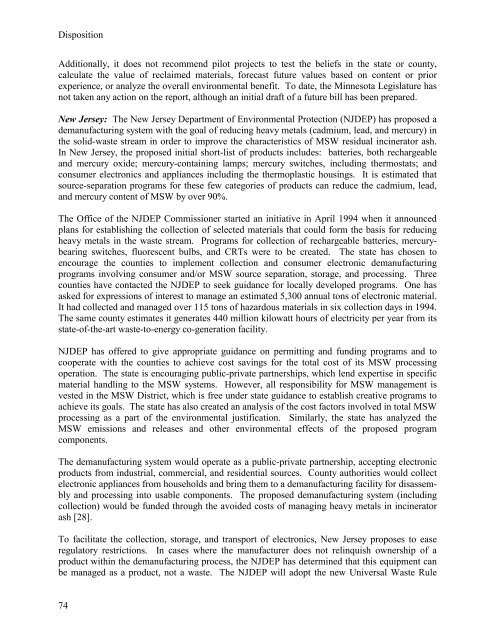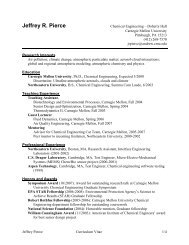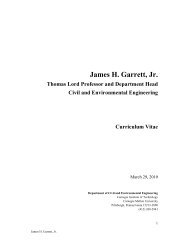1996 Electronics Industry Environmental Roadmap - Civil and ...
1996 Electronics Industry Environmental Roadmap - Civil and ...
1996 Electronics Industry Environmental Roadmap - Civil and ...
You also want an ePaper? Increase the reach of your titles
YUMPU automatically turns print PDFs into web optimized ePapers that Google loves.
Disposition<br />
Additionally, it does not recommend pilot projects to test the beliefs in the state or county,<br />
calculate the value of reclaimed materials, forecast future values based on content or prior<br />
experience, or analyze the overall environmental benefit. To date, the Minnesota Legislature has<br />
not taken any action on the report, although an initial draft of a future bill has been prepared.<br />
New Jersey: The New Jersey Department of <strong>Environmental</strong> Protection (NJDEP) has proposed a<br />
demanufacturing system with the goal of reducing heavy metals (cadmium, lead, <strong>and</strong> mercury) in<br />
the solid-waste stream in order to improve the characteristics of MSW residual incinerator ash.<br />
In New Jersey, the proposed initial short-list of products includes: batteries, both rechargeable<br />
<strong>and</strong> mercury oxide; mercury-containing lamps; mercury switches, including thermostats; <strong>and</strong><br />
consumer electronics <strong>and</strong> appliances including the thermoplastic housings. It is estimated that<br />
source-separation programs for these few categories of products can reduce the cadmium, lead,<br />
<strong>and</strong> mercury content of MSW by over 90%.<br />
The Office of the NJDEP Commissioner started an initiative in April 1994 when it announced<br />
plans for establishing the collection of selected materials that could form the basis for reducing<br />
heavy metals in the waste stream. Programs for collection of rechargeable batteries, mercurybearing<br />
switches, fluorescent bulbs, <strong>and</strong> CRTs were to be created. The state has chosen to<br />
encourage the counties to implement collection <strong>and</strong> consumer electronic demanufacturing<br />
programs involving consumer <strong>and</strong>/or MSW source separation, storage, <strong>and</strong> processing. Three<br />
counties have contacted the NJDEP to seek guidance for locally developed programs. One has<br />
asked for expressions of interest to manage an estimated 5,300 annual tons of electronic material.<br />
It had collected <strong>and</strong> managed over 115 tons of hazardous materials in six collection days in 1994.<br />
The same county estimates it generates 440 million kilowatt hours of electricity per year from its<br />
state-of-the-art waste-to-energy co-generation facility.<br />
NJDEP has offered to give appropriate guidance on permitting <strong>and</strong> funding programs <strong>and</strong> to<br />
cooperate with the counties to achieve cost savings for the total cost of its MSW processing<br />
operation. The state is encouraging public-private partnerships, which lend expertise in specific<br />
material h<strong>and</strong>ling to the MSW systems. However, all responsibility for MSW management is<br />
vested in the MSW District, which is free under state guidance to establish creative programs to<br />
achieve its goals. The state has also created an analysis of the cost factors involved in total MSW<br />
processing as a part of the environmental justification. Similarly, the state has analyzed the<br />
MSW emissions <strong>and</strong> releases <strong>and</strong> other environmental effects of the proposed program<br />
components.<br />
The demanufacturing system would operate as a public-private partnership, accepting electronic<br />
products from industrial, commercial, <strong>and</strong> residential sources. County authorities would collect<br />
electronic appliances from households <strong>and</strong> bring them to a demanufacturing facility for disassembly<br />
<strong>and</strong> processing into usable components. The proposed demanufacturing system (including<br />
collection) would be funded through the avoided costs of managing heavy metals in incinerator<br />
ash [28].<br />
To facilitate the collection, storage, <strong>and</strong> transport of electronics, New Jersey proposes to ease<br />
regulatory restrictions. In cases where the manufacturer does not relinquish ownership of a<br />
product within the demanufacturing process, the NJDEP has determined that this equipment can<br />
be managed as a product, not a waste. The NJDEP will adopt the new Universal Waste Rule<br />
74






